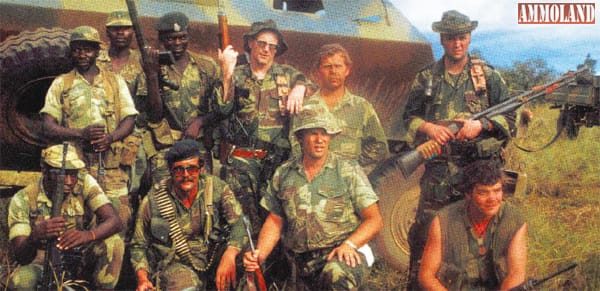By Lt. Col. Robert K. Brown USAR (Ret.)


Boulder, CO – -(Ammoland.com)- Rhodesia Falls -Rhodesia Falls Independent Rhodesia, with its short and violent history, had captured international attention for years.
In the early 1960s, Southern Rhodesia had been a self-governing British colony in the Federation of Rhodesia and Nyasaland that included Zambia, Southern Rhodesia and Nyasaland.
Nyasaland broke off in 1964 and called itself Malawi. In 1965, the Rhodesian government got together with the British government to try to sort out a way to end the war that was smoldering and about to explode. But the 1965 decolonization talks between the United Kingdom and the de facto Rhodesia white government accomplished nothing.
The Brits wanted one man, one vote. Ian Smith, the governor of Rhodesia and leader of the Rhodesia Front, would have none of that because, of course, that would mean the blacks would get into power. It would devolve into a case of, “one man, one vote–once.” How right he was!
So the white Rhodesians unilaterally implemented the Universal Declaration of Independence (UDI) in 1965. By the late 1970s, Rhodesia was falling to the insurgent terrorists after a rocky 15-year existence. In 1978, in an effort to put an end to the hostilities, an interim agreement was signed in Salisbury. A white vote referendum approved the establishment of an interim government. It consisted of an Executive Council made up of white Ian Smith, and blacks Bishop Muzorewa, Sithole and Jeremiah Chirau.
The “internal settlement,” proposed in a desperate attempt by the Ian Smith government to put an end to the civil war, resulted in a new constitution being drafted and an election scheduled. The country was renamed Zimbabwe Rhodesia. Elections were held and the Union African National Council (UANC) won. Josiah Gumede was elected president and Muzorewa prime minister.
But the odd men and losers, the two main terrorist leaders Robert Mugabe and Nkomo, refused to accept the results of the election and ramped up their bloody terrorist insurgencies. In 1979, Ian Smith and Muzorewa were having Lancaster House talks with Margaret Thatcher. The Cold War was still hot and Russia and China had essentially taken over the two major terror organizations by providing abundant amounts of training, indoctrination, weapons and other war supplies; the communists had infiltrated the blacks.
There was heavy fighting the entire year before the elections. Anti-Smith government guerrillas launched a terror campaign against the white farmers. For the white government and its black citizen allies, it was nothing but anti-terrorist warfare.

From the beginning, Ian Smith’s Rhodesia had only a handful of friends, including South Africa and Israel, which recognized it as a sovereign state and helped keep its economy alive. The United States and the United Kingdom banded together, refusing to recognize Ian Smith’s Rhodesia and forcing him to recruit foreign volunteers to help his undermanned army defend his country. In spite of the fact that the country once boasted one of the most vibrant economies in Africa and loads of resources, it was landlocked and choked out by the neighboring African armies.
Supposedly there was to be a cease-fire and proper elections, one man, one vote.
The Bush War, or the War of Chimurenga, was the most exotic of the many prolonged and vicious African wars of decolonization that glamorized the 20th century merc. It was a civil war that relied on hired guns, a war of terror for both white and black Rhodesians to match the current war on terror, although in a limited theater. The non-conventional, racial war of independence was shattered by betrayals, whether blacks against whites or blacks against blacks or whites against both.
In addition to Vietnam vets, Dogs of War from all over the globe, from Europe to Australia to South America to America, Canada, and Africa, itching for a good old fight against a bunch of savages terrorizing farmers and Bushmen, signed up. All sorts of adventurers, ne’er do wells and fugitives from all over the world headed for the land of hired guns, some intent on fighting the communist-backed terrorists and others just to kick some butt. Rhodesian Army recruiting posters splashed in the pages of SOF magazine and on the walls of merc recruiting offices lured those of all ages hankering for a risky adventure. Foreign volunteers, seeing the invites, trotted off to Rhodesia to fight the Commies who were supporting the terrorists or just for a good firefight.
The counterinsurgency regiments— the famed Commando Rhodesian Light Infantry and the Rhodesian Special Air Services (SAS)— fighting the commies had built up formidable reputations. The daunting Selous Scouts, the covert elite special force regiment of 1000 that consisted of black and white, with a majority of blacks, were credited with gathering spot-on intelligence for the regular army. They would pose as terrorists and develop intelligence. They would infiltrate the guerrillas find out where the terrorists were, and radio in their coordinates to the Rhodesian Army. They took out nearly two-thirds of the terrorists during the Bush War. For a foreign volunteer to join up with them would be a mercenary’s reverie.
When I heard about how the terrorist leader Robert Mugabe threatened to steal the elections in Rhodesia in 1980, I was outraged, although not one bit surprised.

I had almost given up on getting to fight some terrs after six visits to Rhodesia from 1974–80, each time itching for a firefight but leaving without having found one. The only excitement I had found was on my first trip to Rhodesia, in May 1974, before I launched SOF, when I linked up with an American serving with the British South African Police Support Unit. We careened about on dirt roads in terr-infested northwest Rhodesia for a few days, but the only excitement was provided by the driving of the merc, who had been a race car driver in England and Australia.
Finally, unexpectedly, in March 1980 I found my firefight, when I decided that we had to be in Rhodesia for the elections, which were bound to be bloody.
Pick up my book, I Am Soldier of Fortune ( https://tiny.cc/z20b0w ), and read the rest of the story, as well as how we met a Rhodesian farmer who was betrayed by a very unusual suspect. Order the book now at sofmag.com
About Soldier of Fortune Magazine
SOLDIER OF FORTUNE focuses on news and adventure based on firsthand reports from all over the world. Our commitment to presenting the facts in their entirety sets us apart from mainstream news sources. Our editorial policy is pro-military, pro-strong U.S. defense, pro-police, and pro-veteran. We strongly support the right of the individual to keep and bear arms. By opposing tyranny of all kinds, we support the basic freedom of mankind. Visit: www.sofmag.com Click to Subscribe to Soldier of Fortune Magazine ( Subscribe on Amazon https://tiny.cc/11gy6w )
